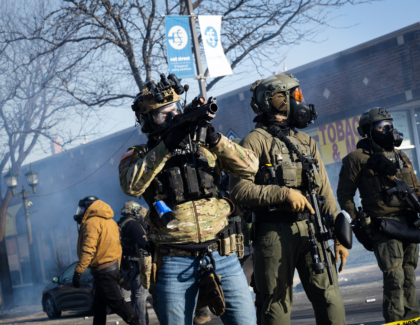Sign up for the daily CJR newsletter.
A recent Zogby poll has lit up the blogosphere for several days now with its claim that a majority of Americans are on board for U.S. military action against Iran. Both sides of the aisle are lamenting or celebrating accordingly, but a closer look at the poll itself could save everyone the effort.
For starters, Zogby’s claim, as worded in the title of their release, that “52% Support U.S. Military Strike Against Iran” is different than the wording underneath the title, “A majority of likely voters – 52% – would support a U.S. military strike to prevent Iran from building a nuclear weapon.” The emphasis is my own, and highlights the mushroom-cloud sized qualification – a hypothetical as large as say, “Would you support invading Iraq to seize their WMDs?” – that puts the poll’s validity on shaky ground.
For starters, the question of whether a nuke is within reach for the Iranians is still very much a hypothetical. As Barnett Rubin pointed out when attacking Weekly Standard writer Michael Goldfarb’s interpretation of the Zogby poll:
The International Atomic Energy Agency (whose record on such matters is far more reliable than that of the Weekly Standard) says it has no evidence that Iran is building a nuclear weapon. Fareed Zakaria of Newsweek, noting that the rhetoric on Iran of people like Goldfarb “has lost all connection to reality,” reminds us that “Iran doesn’t have a nuclear button yet and won’t for at least three to eight years, according to the CIA.”
Given these “facts,” (sorry to bring that up), a military strike by the U.S. against Iran now and a military strike to prevent Iran from building a nuclear weapon are not the same thing. The latter is invoked to justify the former.
Polls, if they have any significance, are meant to gauge political opinion at a given moment in time, that moment being the time that someone’s phone rings and he or she gets up from the dinner table to answer a litany of questions. Given that the prospects for an Iranian nuke are at least relatively long-term, it makes little sense to use the percentage of American’s that would support military action to stop the nukes as the percentage of American’s who currently support a strike.
A second problem with the Zogby poll is that putting the task of stopping nuclear proliferation solely on the shoulders of the U.S. military ignores the fact that there are many other diplomatic alternatives that could prove effective against Iran. Asking voters opinions on a highly complex foreign policy issue and giving them exactly two options (bomb Iran or don’t bomb Iran) can hardly say much about public opinion on the topic. CJR’s Gal Beckerman posted last week on the media’s similarly simplistic framing of the question to presidential hopefuls.
Finally, the 52% of those polled who did say that, given the condition that Iran is about to develop a nuke, they would support military action, did not say that they unequivocally supported bombing Tehran. They answered in the affirmative given a hypothetical, a fact that has been ignored in interpretations of the poll by many, many people, from amateur bloggers to Time magazine’s Cairo bureau chief Scott MacLeod.
There are plenty of hypothetical questions worth asking, but let’s not confuse a future, abstract foreign policy debate with a present, discernible one. And let’s certainly not pretend that “to bomb or not to bomb” is the only question.
Has America ever needed a media defender more than now? Help us by joining CJR today.






